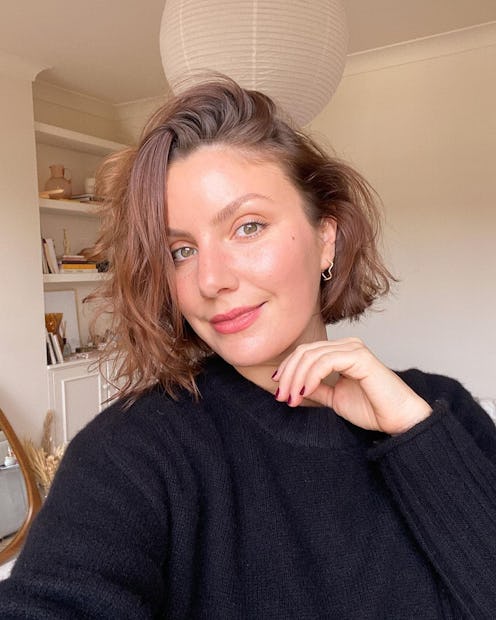(Hair)
Combination Skin Is A Thing, But Did You Know It Can Apply To Your Hair Too?
Hair experts reveal the hair type no one talks about.

You’ve heard of combination skin — that is, skin that’s oily in some areas and dry in others — but experts are pointing to the fact that this beauty classification could be made about your hair, too. The premise is similar to its definition as a skin type and refers to hair that’s a blend of two extremes: dehydration and oiliness. Simply put: Combination hair is hair that’s oily at the roots and dry at the ends.
Just like combination skin can be caused by everything from weather conditions to skin care habits, combination hair has a few different causes, too — namely, scalp type. “Oily scalps are more prone to being a combination hair type since they produce more sebum, the natural oil from the skin’s sebaceous glands,” says Dr. Iris Rubin, dermatologist and founder of SEEN Hair Care. Those with an oily scalp may find that they need to wash their hair daily to get rid of the oiliness. The problem with this? More frequent washing can dry out the hair due to the surfactants or cleansing agents found in shampoos. Not to mention, in many cases, more frequent washing means more heat styling, which also increases the chance of dry ends associated with combination hair, says Dr. Rubin.
Adam Federico, R+Co Director of Content, adds that washing the hair and scalp too frequently can strip the scalp of its natural oils, which can paradoxically lead to dehydration. “To compensate for the lack of moisture as a result of over-washing, the scalp will over-produce oil, leading to oily roots,” he says. As for the ends, heat styling and coloring can all contribute to dryness and frizziness.
Beyond scalp type, your hair type also plays a role. Those with fine hair are more prone to experiencing buildup, which means they’re more likely to over-wash their hair. This can result in combination hair if they’re pairing this over-washing with other strand-damaging practices such as heat styling. Those with curly or long hair are also susceptible to combination hair. According to celebrity hairstylist, Danielle Priano, dry, frizzy ends indicate that the oils from the scalp are not distributing well down the hair shaft. This is common in those with curly or extra long hair, as this shape and length can “make it difficult for the oil from the scalp to travel to the ends,” she says.
How To Care For Combination Hair
Managing combination hair doesn’t have to be as difficult as it sounds. First step? Adjusting your shampoo and conditioner routine. To combat oily roots, Priano recommends incorporating a clarifying shampoo into your lineup, as it can “help cleanse and balance the scalp when there’s an excess of oil, product, or water mineral buildup,” she says. Keep these treatments to a minimum (Priano recommends no more than twice a month), as overdoing it can stimulate more oil production.
As for conditioner, Priano says to look for ones that contain silicone to lock in moisture and enhance shine, esters such as glycerin to prevent breakage, and fatty acids such as safflower, coconut, or avocado oil to control moisture loss. To apply conditioner, work it “through the mid-lengths to the ends right after shampooing. Then, comb or wet brush the hair and let it sit for a few minutes before rinsing out completely with cold water,” she says. And remember, if you have combination hair, you should avoid applying conditioner where the hair is already naturally greasy — aka your scalp.
An apple cider vinegar rinse is an effective DIY solution for tackling an oily scalp. “Apple cider vinegar works to balance the pH of the hair and scalp, leaving it primed for functioning optimally. And when the scalp functions optimally, it produces less oil,” says Federico. ACV also has properties that extend beyond nixing oily roots: it’s antibacterial, a natural detangler, and closes the hair cuticle, which can boost shine.
Finally, Priano says to avoid using dry shampoo as an alternative to washing. “This can cause product build up and, in many cases, worsen the condition of an oily, itchy scalp,” she says. “If you have a yellowish dandruff and itch, consider consulting a dermatologist as you may require medical help to regain balance.”
In need of a few products to help manage your combination hair? Check out some expert-favorites below.
We only include products that have been independently selected by TZR's editorial team. However, we may receive a portion of sales if you purchase a product through a link in this article.
This article was originally published on